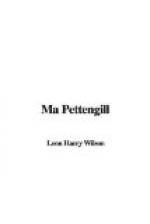* * * * *
I rolled another cigarette for the injured woman it being no time for words.
“It just goes to show,” she observed after the first relishing draft, “that we should be honest, even with defectives like old Timmins. This man in Seattle that keeps track of prices for me writes that the top of the mule market has blown sky-high; that if I got anything looking at all like a mule not to let it go off the place for less than two hundred dollars, because mule buyers is sure desperate. Safety must of got the same tip, only you can bet his correspondent put the full three cents on the letter. Safety would never have trusted a strange postmaster with the excess. Anyway he sold that bunch of rabbits a week later for one hundred and seventy-five a head, thus adding twenty-two hundred and fifty dollars of my money to his tainted fortune. You can imagine the pins and needles he’d been on for a week, scared I’d get the tip and knowing if he even mentioned them runts at any price whatever that I’d be wise at once. That joke of the boys must of seemed heaven-sent to him.
“You ought to heard the lecture I read them fool punchers on common honesty and how the biter is always bit. I scared ’em good; there hasn’t been an elephant on the place since that day. They’re a chastened lot, all right. I was chastened myself. I admit it. I don’t hardly believe I’ll ever attempt anything crooked on old Safety again—–and yet, I don’t know.”
The lady viciously expelled the last smoke from her cigarette and again took up the knitting.
“I don’t really know but if there was some wanton, duplicity come up that I could handle myself and not have to leave to that pack of amateur thieves out in the bunk house, and it was dead sure and I didn’t risk doing more than two years’ penal servitude—yes, I really don’t know. Even now mebbe all ain’t over between us.”
II
A LOVE STORY
I had for some time been noting a slight theatrical tinge to the periodical literature supported by the big table in the Arrowhead living room. Chiefly the table’s burden is composed of trade journals of the sober quality of the Stockbreeder’s Gazette or Mine, Quarry & Derrick or the “Farmer’s Almanac.” But if, for example, one really tired of a vivacious column headed “Chats on Fertilizers” one could, by shuffling the litter, come upon a less sordid magazine frankly abandoned to the interests of the screen drama.
The one I best recall has limned upon its cover in acceptable flesh tints a fair young face of flawless beauty framed in a mass of curling golden ringlets. The dewy eyes, shaded to mystery by lashes of uncommon length, flash a wistful appeal that is faintly belied by the half-smiling lips and the dimpling chin. The contours are delicate yet firm; a face of haunting appeal—a face in which tears can be seldom but the sprightly rain of April, and the smile, when it melts the sensitive lips, will yet warn that hearts are made to ache and here is one not all too merry in its gladness. It is the face of one of our famous screen beauties, and we know, even from this tinted half-tone, that the fame has been deserved.




